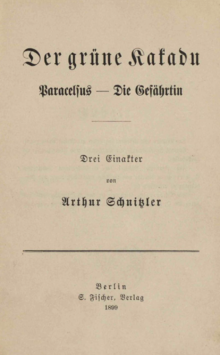The companion
| Data | |
|---|---|
| Title: | The companion |
| Genus: | Acting in one act |
| Original language: | German |
| Author: | Arthur Schnitzler |
| Publishing year: | 1899 |
| Premiere: | March 1, 1899 |
| Place of premiere: | Burgtheater , Vienna |
| Place and time of the action: | in a summer vacation not far from Vienna; on an autumn evening last year |
| people | |
|
|
The companion is a play in one act by Arthur Schnitzler , which was premiered on March 1, 1899 in the Burgtheater . In the same year, S. Fischer in Berlin published the text edition together with the one-act plays The Green Cockatoo and Paracelsus .
In a first version, Schnitzler had already dealt with the subject matter of a husband who had to revise his view of marriage due to discoveries after the death of his wife, in the novella Der Wittwer published in 1894 . This became the template from which Schnitzler worked out the subject dramatically from 1896.
time and place
The piece takes place on an autumn evening towards the end of the 19th century in a summer resort near Vienna.
content
The mourners believe that Robert never loved his Eveline, who died of a heart attack . The professor appears accordingly. He wants to forget; dive into academic work. His neighbor Olga Merholm appears and wants letters back that she once wrote to Eveline. In the course of the dialogue between the two neighbors, the viewer learns that Robert saw Eveline as a lover, not a companion. Worse still - Robert suggests that his wife had a relationship with his friend Dr. Alfred Hausmann during his lifetime. It started three years ago.
Alfred arrives at the news of his death. Robert soon realizes that everything was very different. Alfred has had a Viennese bride for two years. Despite this surprising clarification, the newcomer is chased out by the host. Alfred goes.
Olga explains to Robert and the audience. Alfred didn't betray Robert. Eveline knew that Alfred was about to get married. That is also evident from the letters that Olga wants back. Robert doesn't understand at all. If Olga knew everything, why didn't she tell him about it? Olga only has regrets for Eveline's lonely life.
reception
- Kerr also praises Schnitzler's drama because it contains the design elements of “concealment” and “waiver of completeness”. In The companion , the exact applicability of the assertion of the above. Theater critic can be proven, for example, in the figure of Olga Merholm. The viewer has to think, however, until he realizes: The widower Professor Pilgram, blinded during his wife's lifetime, sought the closeness of his married neighbor Olga Merholm. Now that his friend Doctor Alfred Hausmann has opened his eyes to his relationship with the deceased Eveline, the widower clears the table. He leaves the summer resort. The professor moves away from the neighbor, who deliberately left him in the dark.
- The piece demonstrates the futility of civil marriage (Scheible).
- In his brief review, Korte classifies the play as an analytical drama .
Film adaptations
- "The Companion". Director: Alfred Braun . ARD , SFB anno 1954. Actors: Ruth Grossi , Günther Hadank , Wolfgang Lukschy .
- "The Companion". Director: Peter Steinbach . ARD, WDR anno 1966. Cast: Carl Lange , Hertha Martin , Hannes Siegl .
Radio plays
Radio plays ( Memento from December 5, 2008 in the Internet Archive ), entries 28 and 29
- “The companion” - directed by Otto Ambros on May 12, 1946 from the ORF studio in Vienna.
- "The companion" - directed by Klaus Gmeiner on December 20, 1975 broadcast by ORF and the SFB. Actors: Romuald Pekny , Aglaja Schmid , Kurt Heintel , Hubert Kiurina , Peter Uray and Leopold Rudolf .
Web links
- The companion in the Gutenberg-DE project
- events.at : Brief discussion
- Gabi Stockmann : Brief discussion
literature
- source
- Arthur Schnitzler: The companion. Play in one act. Pp. 259–277 in Heinz Ludwig Arnold (ed.): Arthur Schnitzler: Reigen. The one-act. With an afterword by Hermann Korte . S. Fischer, Frankfurt am Main 1961 (edition 2000). 602 pages, ISBN 3-10-073557-9
- First edition
- Arthur Schnitzler: The Green Cockatoo - Paracelsus - The Companion . S. Fischer Berlin 1899 http://www.digital.wienbibliothek.at/wbrobv/content/titleinfo/1488075
- Secondary literature
- Therese Nickl (Ed.), Heinrich Schnitzler (Ed.): Arthur Schnitzler. Youth in Vienna. An autobiography. With an afterword by Friedrich Torberg . Fischer paperback. Frankfurt am Main 2006. 381 pages, ISBN 978-3-596-16852-1 (© Verlag Fritz Molden , Vienna 1968)
- Hartmut Scheible : Arthur Schnitzler. rowohlt's monographs. Rowohlt Taschenbuch Verlag, Reinbek near Hamburg, February 1976 (December 1990 edition). 160 pages, ISBN 3-499-50235-6
- Peter Sprengel : History of German-Language Literature 1870–1900. From the founding of the empire to the turn of the century . CH Beck , Munich 1998, ISBN 3-406-44104-1
- Gero von Wilpert : Lexicon of world literature. German Authors A - Z . S. 555, 2nd column, 20. Zvu Stuttgart 2004. 698 pages, ISBN 3-520-83704-8
